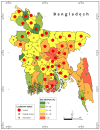COVID-19 induced economic loss and ensuring food security for vulnerable groups: Policy implications from Bangladesh
- PMID: 33064771
- PMCID: PMC7567397
- DOI: 10.1371/journal.pone.0240709
COVID-19 induced economic loss and ensuring food security for vulnerable groups: Policy implications from Bangladesh
Abstract
At present nearly half of the world's population is under some form of government restriction to curb the spread of COVID-19, an extremely contagious disease. In Bangladesh, in the wake of five deaths and 48 infections from COVID-19, between March 24 and May 30, 2020, the government imposed a nationwide lockdown. While this lockdown restricted the spread of COVID-19, in the absence of effective support, it can generate severe food and nutrition insecurity for daily wage-based workers. Of the 61 million employed labor force in Bangladesh, nearly 35% of them are paid on a daily basis. This study examines the food security and welfare impacts of the COVID-19 induced lockdown on daily wage workers both in the farm and nonfarm sectors in Bangladesh. Using information from more than 50,000 respondents complied with the 2016-17 Household Income and Expenditure Survey (HIES) in Bangladesh, this study estimates daily wage rates as Bangladesh Taka (BDT) 272.2 in the farm sector and BDT 361.5 in the nonfarm sector. Using the estimated daily wage earnings, this study estimates that a one-day complete lockdown generates a US$64.2 million equivalent economic loss only considering the wage loss of the daily wage workers. After estimating the daily per capita food expenditure separately for farm and nonfarm households, this study estimates a minimum compensation package for the daily wage-based farm and nonfarm households around the US $ 1 per day per household to ensure minimum food security for the daily wage-based worker households.
Conflict of interest statement
The authors have declared that no competing interests exist.
Figures
Similar articles
-
[A scenario to safely ease the covid-19 lockdown while allowing economic recovery].Virologie (Montrouge). 2020 Apr 1;24(2):23-25. doi: 10.1684/vir.2020.0842. Virologie (Montrouge). 2020. PMID: 32540825 French.
-
Notes on cost benefit of COVID-19 lockdown.J Appl Clin Med Phys. 2020 Jul;21(7):4-6. doi: 10.1002/acm2.12970. Epub 2020 Jul 3. J Appl Clin Med Phys. 2020. PMID: 32619322 Free PMC article. No abstract available.
-
The unequal impact of the coronavirus pandemic: Evidence from seventeen developing countries.PLoS One. 2020 Oct 7;15(10):e0239797. doi: 10.1371/journal.pone.0239797. eCollection 2020. PLoS One. 2020. PMID: 33027272 Free PMC article.
-
Answering 20 more questions on COVID-19 (March-April 2020).J Glob Health. 2020 Dec;10(2):020102. doi: 10.7189/jogh.10.020102. J Glob Health. 2020. PMID: 33110501 Free PMC article. Review. No abstract available.
-
A combination of COVID-19 and dengue fever in Bangladesh: Preparedness of Bangladesh.J Glob Health. 2020 Dec;10(2):020314. doi: 10.7189/jogh.10.020314. J Glob Health. 2020. PMID: 33110517 Free PMC article. Review. No abstract available.
Cited by
-
Simplified within-host and Dose-response Models of SARS-CoV-2.J Theor Biol. 2023 May 21;565:111447. doi: 10.1016/j.jtbi.2023.111447. Epub 2023 Mar 8. J Theor Biol. 2023. PMID: 36898624 Free PMC article.
-
Understanding the Food Insecurity and Coping Strategies of Indigenous Households during COVID-19 Crisis in Chittagong Hill Tracts, Bangladesh: A Qualitative Study.Foods. 2022 Oct 5;11(19):3103. doi: 10.3390/foods11193103. Foods. 2022. PMID: 36230179 Free PMC article.
-
Gender Differences of the Effect of Vaccination on Perceptions of COVID-19 and Mental Health in Japan.Vaccines (Basel). 2023 Apr 10;11(4):822. doi: 10.3390/vaccines11040822. Vaccines (Basel). 2023. PMID: 37112734 Free PMC article.
-
Burden of COVID-19 on health and wellbeing, education, and economy of Bangladesh.Clin Case Rep. 2022 Nov 23;10(11):e6639. doi: 10.1002/ccr3.6639. eCollection 2022 Nov. Clin Case Rep. 2022. PMID: 36439388 Free PMC article.
-
The impact of the COVID-19 pandemic on subsistence consumers' well-being and coping strategies: Insights from India and Bangladesh.J Consum Aff. 2022 Spring;56(1):180-210. doi: 10.1111/joca.12440. Epub 2022 Feb 16. J Consum Aff. 2022. PMID: 35603322 Free PMC article.
References
-
- WHO. Coronavirus disease (COVID- 19) Pandemic: Public advice. In: World Health Organization (WHO) [Internet]. 2020 [cited 19 Aug 2020]. Available: https://www.who.int/emergencies/diseases/novel-coronavirus-2019
-
- Schumaker E. Timeline: How Coronavirus Got Started: The outbreak spanning the globe began in December, in Wuhan, China. ABC News. 2020: 1–9. Available: https://abcnews.go.com/Health/timeline-coronavirus-started/story?id=6943...
-
- WHO. Coronavirus (COVID-19) events as they happen. In: World Health Organization (WHO): Updated 9 May, 2020. 2020 pp. 1–156.
MeSH terms
LinkOut - more resources
Full Text Sources


